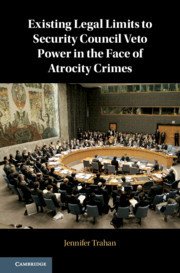Book Launch Event: Existing Legal Limits to Security Council Veto Power in the Face of Atrocity Crimes (Cambridge University Press 2020). This event, co-sponsored by the American Society of International Law International Criminal Law Interest Group and the American Branch of the International Law Association United Nations Committee, will take place on Thursday 23 July 12:00 p.m. – 1:30 p.m. EST (zoom link below). Join leading experts in the field discuss Professor Jennifer Trahan’s new book which examines the legality of the use by a permanent member of the UN Security Council of its veto while there is ongoing genocide, crimes against humanity, or war crimes.
To purchase the book, see here.
Join the Zoom Meeting here.
Book description
In this book, the author outlines three independent bases for the existence of legal limits to the veto by UN Security Council permanent members while atrocity crimes are occurring. The provisions of the UN Charter creating the veto cannot override the UN’s ‘Purposes and Principles’, nor jus cogens (peremptory norms of international law). There are also positive obligations imposed by the Geneva and Genocide Conventions in situations of war crimes and genocide – conventions to which all permanent members are parties. The author demonstrates how vetoes and veto threats have blocked the Security Council from pursuing measures that could have prevented or alleviated atrocity crimes (genocide, crimes against humanity, war crimes) in places such as Myanmar, Darfur, Syria, and elsewhere. As the practice continues despite regular condemnation by other UN member states and repeated voluntary veto restraint initiatives, the book explores how the legality of this practice could be challenged.
Reviews
‘In this bold book, Professor Jennifer Trahan presents a new, major thesis – that when permanent members of the UN Security Council threaten or use their veto power to block measures aimed at preventing or punishing genocide, war crimes or crimes against humanity, they may be acting contrary to international law. She persuasively argues that the use or threat of the veto in such situations can contravene fundamental norms of international law, key international conventions and the ‘Purposes and Principles’ of the United Nations Charter, and suggests ways to challenge the current state of affairs.’
Richard Goldstone – former Founding Prosecutor, The International Criminal Tribunal for the former Yugoslavia, and the International Criminal Tribunal for Rwanda
‘As High Commissioner for Human Rights, I had the opportunity to address the UN Security Council many times and raised my concerns over the use of the veto to block action when factual evidence of egregious human rights violations was presented to the Council. This book provides an invaluable, authoritative analysis of the legality of the use of the veto in situations of ongoing genocide, crimes against humanity, and war crimes, measured against legal obligations emanating from jus cogens, the UN Charter, and foundational treaties.’
Navi Pillay – former United Nations High Commissioner for Human Rights
‘This bold and courageous book is on the right side of history.’
Mark A. Drumbl – Class of 1975 Alumni Professor of Law, Washington and Lee University




